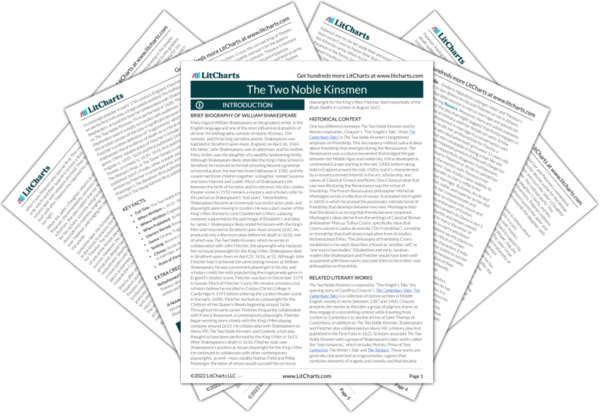The Two Noble Kinsmen’s central conflict revolves around the love triangle that develops between the knights Arcite and Palamon and the Athenian duke’s sister-in-law, Emilia. Arcite and Palamon are cousins who have been imprisoned in Athens, and they become enamored with Emilia after witnessing her wandering around the garden below their cell. Almost immediately, their love morphs into a maddening obsession that threatens to destroy the integrity of their close friendship to which they’ve just pledged eternal devotion. Palamon sees Emilia first, but Arcite claims he has an equal right to Emilia’s heart. In a matter of minutes, hatred, jealousy, and rage destroy Arcite and Palamon’s close bond, as they become rivals willing to fight to the death to secure Emilia’s love. Adding to the irrationality of their feud is the unlikelihood that a romance between either cousin and Emilia, a noblewoman, could develop in the first place: neither man pauses to consider that, as an Athenian noblewoman, Emilia likely has little interest in two imprisoned Theban soldiers. The scene depicts a stereotypical “love at first sight” encounter made absurd by the comical one-sidedness of the romance. Arcite and Palamon find themselves instantaneously and wholeheartedly invested in a woman who has given them no indication that she loves them back—or that she even knows they exist.
This absurdity makes the cousins’ respective fates—Arcite’s death, and Palamon’s—all the more tragically senseless. Love causes Arcite and Palamon to forgo logic and abandon reality entirely: in their quest for romantic fulfillment, they become willful participants in the dismantling of their friendship and the endangerment of their very lives. Furthermore, it’s important to consider that Emilia never once expresses romantic interest in Arcite and Palamon. In fact, she explicitly says she doesn’t want to marry and only agrees to wed one of the cousins out of a moral obligation to not be responsible for sending both cousins to their deaths. Emilia’s disinterest in either suitor makes cousins’ feud especially pointless, since whatever romantic fulfillment they could hope to achieve through a relationship with an unloving, indifferent spouse surely would be less gratifying than the fulfillment they experienced in their friendship. The swift and senseless disintegration of Arcite and Palamon from devoted friends to bitter rivals portrays love as an intoxicating, maddening force that drives people to behave recklessly, illogically, and destructively.
Love and Irrationality ThemeTracker

Love and Irrationality Quotes in The Two Noble Kinsmen
Their knot of love,
Tied, weaved, entangled, with so true, so long,
And with a finger of so deep a cunning,
May be outworn, never undone. I think
Theseus cannot be umpire to himself,
Cleaving his conscience into twin and doing
Each side like justice, which he loves best.
You’re out of breath,
And this high-speeded pace is but to say
That you shall never—like the maid Flavina—
Love any that’s called man.
Nay, most likely, for they are noble suff’rers.
I marvel how they would have looked had they
been victors, that with such a constant nobility enforce
a freedom out of bondage, making misery
their mirth and affliction a toy to jest at.
Yet, cousin,
Even from the bottom of these miseries,
From all that fortune can inflict upon us,
I see two comforts rising, two mere blessings,
If the gods please: to hold here a brave patience,
And the enjoying of our griefs together.
Whilst Palamon is with me, let me perish
If I think this our prison!
Men are mad things.
It is the very emblem of a maid.
For when the west wind courts her gently,
How modestly she blows and paints the sun
With her chaste blushes! When the north comes near her,
Rude and impatient, then, like chastity,
She locks her beauties in her bud again,
And leave him to base briers.
Have I called thee friend?
I shall live
To knock thy brains out[.]
[…] To marry him is hopeless;
To be his whore is witless.
Mark how his virtue, like a hidden sun,
Breaks through his baser garments
I love him beyond love and beyond reason
Or wit or safety. I have made him know it;
I care not, I am desperate.
Here, Palamon. This hand shall never more
Come near thee with such friendship.
I’ll be cut a-pieces
Before I take this oath!
No, never duke. ’Tis worse to me than begging
To take my life so basely; though I think
I shall never enjoy her, yet I’ll preserve
The honor of affection, and die for her,
Make death a devil!
What sins have I committed, chaste Diana,
That my unspotted youth must now be soiled
With blood of princes, and my chastity
Be made the altar where the lives of lovers—
Two greater and two better never yet
Made mothers joy—must be the sacrifice
To my unhappy beauty?
’Tis pity love should be so tyrannous.—
O, my soft-hearted sister, what think you?
Weep not till they weep blood. Wench, it must be.
Poor wench, go weep, for whosoever wins
Loses a noble cousin for thy sins.
Hail, sovereign queen of secrets, who hast power
To call the fiercest tyrant from his rage
And weep unto a girl[.]
Is this winning?
O all you heavenly powers, where is your mercy?
But that your wills have said it must be so,
And charge me live to comfort this unfriended,
This miserable prince, that cuts away
a life more worthy from him than all women,
I should and would die too.
Infinite pity
That four such eyes should be so fixed on one
That two must needs be blind for ‘t.













